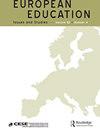“用父母的陈词滥调说话的孩子”:探索立陶宛大屠杀教育中文化习俗与教师身份之间更广泛的社会关系
IF 0.9
Q4 EDUCATION & EDUCATIONAL RESEARCH
引用次数: 0
摘要
本文探讨了更广泛的文化习俗如何影响立陶宛教授大屠杀的教师。本文运用“文化课程”的概念来考察社区“故事”如何与正规教育相交叉。研究发现,教师们现在也觉得他们有责任挑战长期存在的文化习俗。这并不总是受欢迎的,因为大多数人不确定如何参与社区行为,同时保持他们在社区中的地位。本文章由计算机程序翻译,如有差异,请以英文原文为准。
“Children Who Speak in Their Parents’ Clichés”: Exploring the Broader Social Relationship Between Cultural Practices and Teacher Identity in Lithuanian Holocaust Education
This article examines how broader cultural practices influence teachers teaching the Holocaust in Lithuania. This article uses the concept of the “cultural curriculum” to examine how community “stories” intersect with formal education. It finds that teachers feel they have become responsible for challenging long-standing cultural practices as well now. This is not always welcome because most are uncertain how to engage with community behaviors and preserve their place in the community at the same time.
求助全文
通过发布文献求助,成功后即可免费获取论文全文。
去求助
来源期刊

European Education
EDUCATION & EDUCATIONAL RESEARCH-
CiteScore
1.20
自引率
0.00%
发文量
5
期刊介绍:
uropean Education is published in association with the Comparative Education Society in Europe (CESE). It is an international peer-reviewed journal devoted to original inquiries and dialogue on education across the member states of the Council of Europe. Established in 1969, the journal features articles on education in individual member states, comparative studies on education across Europe, as well as the impact of European education initiatives globally. The journal especially encourages theoretical and empirical studies, interdisciplinary perspectives, and critical examination of the impact of political, economic, and social forces on education. European Education includes reviews of books and educational films, including those published/produced in English and other languages.
 求助内容:
求助内容: 应助结果提醒方式:
应助结果提醒方式:


